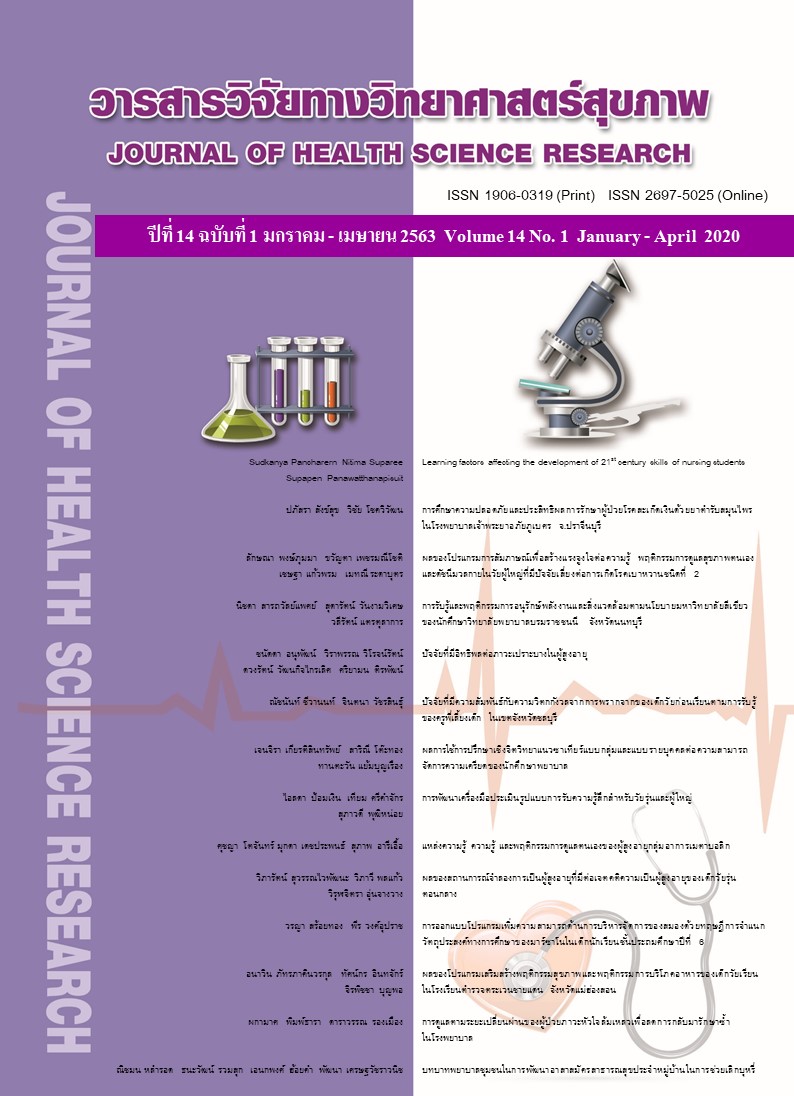การออกแบบโปรแกรมเพิ่มความสามารถด้านการบริหารจัดการของสมองด้วยทฤษฎีการจำแนกวัตถุประสงค์ทางการศึกษาของมาร์ซาโนในเด็กนักเรียนชั้นประถมศึกษาปีที่ 6
Main Article Content
บทคัดย่อ
วัตถุประสงค์การวิจัย: เพื่อออกแบบโปรแกรมเพิ่มความสามารถด้านการบริหารจัดการของสมองด้วยทฤษฎีการจำแนกวัตถุประสงค์ทางการศึกษาของมาร์ซาโนในเด็กนักเรียนชั้นประถมศึกษาปีที่ 6
วิธีการวิจัย: ทดสอบประสิทธิภาพของโปรแกรม จากการทดสอบความสามารถด้านการบริหารจัดการสมองด้วยการใช้แบบทดสอบความสามารถด้านการบริหารจัดการสมอง และทดสอบก่อนและหลังใช้งานกับกลุ่มตัวอย่าง จำนวน 20 คน และเปรียบเทียบคะแนนเฉลี่ยความสามารถด้านการบริหารจัดการของสมองจากการใช้สถิติการทดสอบความแตกต่างของค่ากลางของสองประชากรไม่อิสระกัน โดยใช้สถิติ paired sample t-test
ผลการวิจัย: การฝึกด้วยโปรแกรมเพิ่มความสามารถด้านการบริหารจัดการของสมองด้วยทฤษฎีการจำแนกวัตถุประสงค์ทางการศึกษาของมาร์ซาโน หลังฝึกมีประสิทธิภาพดีกว่าก่อนฝึก และผลการออกแบบโปรแกรมฯ ผู้เชี่ยวชาญให้ความเห็นว่าโปรแกรมฯ ในภาพรวมในระดับความเหมาะสมมากที่สุด สำหรับเพิ่มความสามารถด้านการบริหารจัดการของสมอง และพบว่า เด็กนักเรียนชั้นประถมศึกษาปีที่ 6 สามารถปฏิบัติกิจกรรมตามโปรแกรมฯ ได้อย่างดี และมีความพึงพอใจต่อโปรแกรมฯ ในภาพรวมในระดับความเหมาะสมมาก
สรุปผล: การศึกษาชี้ให้เห็นว่า การฝึกด้วยโปรแกรมเพิ่มความสามารถด้านการบริหารจัดการของสมองด้วยทฤษฎีการจำแนกวัตถุประสงค์ทางการศึกษาของมาร์ซาโนมีประสิทธิภาพสูง
Downloads
Article Details
บทความที่ได้รับการตีพิมพ์เป็นลิขสิทธิ์ของวิทยาลัยพยาบาลบรมราชชนนี จังหวัดนนทบุรี
ข้อความที่ปรากฏในบทความแต่ละเรื่องในวารสารวิชาการเล่มนี้เป็นความคิดเห็นส่วนตัวของผู้เขียนแต่ละท่านไม่เกี่ยวข้องกับวิทยาลัยพยาบาลบรมราชชนนี จังหวัดนนทบุรี และคณาจารย์ท่านอื่น ในวิทยาลัยฯ แต่อย่างใด ความรับผิดชอบองค์ประกอบทั้งหมดของบทความแต่ละเรื่องเป็นของผู้เขียนแต่ละท่าน หากมีความผิดพลาดใด ๆ ผู้เขียนแต่ละท่านจะรับผิดชอบบทความของตนเองแต่ผู้เดียว
เอกสารอ้างอิง
Garon N, Bryson SE, Smith IM. Executive function in preschoolers: A review using an integrative framework. Psychol Bull. 2008;134(1):31-60.
Duncan, j. An adaptive coding model of neural function in prefrontal cortex, Nature Reviews Neuroscience. London: Macmillan Magazines; 2001. p.820-29.
Miller E, Cohen J. An integrative theoryof prefrontal cortex function. Annu Rev
Neurosci. 2001;24(1):167-202.
Shenhav A, Cohen JD, Botvinick MM. Dorsal anterior cingulate cortex and the value of control. Nat Neurosci. 2016;19 (10):1286-291.
Elliott R. Executive functions and their disorders. Br Med Bull. 2003;1(65):49-59.
Davidson MC, Arnso D, Anderson LC, Diamond A. Development of cognitive control and executive functions from 4-13 years: Evidence from manipulations of memory, inhibition, and task switching. Neuropsychologia. 2006;44(1):2037-78.
Dawson P, Guare, R. Executive skills in children and adolescents: A practical guide to assessment and intervention. (2nd ed.). New York: Guilford Press; 2010.
Anderson P. Assessment and development of executive functioning (EF) in childhood.
Child Neuropsychol. 2002;8(2):71-82.
Chevalier N, Martis SB, Curran T, Munakata Y. Metacognitive Processes in executive control development: The case of reactive and proactive control. J Cogn Neurosci. 2015;27(6):1125-36.
Diamond, A. Executive functions. Annu Rev Psychol. 2013;64(1):135-68.
Chan RC, Shum D, Toulopoulou T, Chen E. Assessment of executive functions: Review of Instruments and Identification of critical issues. Arch Clin Neuropsychol. 2008;23(2):201-16.
Johnson RB, Christensen LB. Educational Research: Quantitative, Qualitative, and Mixed Approaches. Boston. MA: Allyn and Bacon; 2004.
Marzano RJ, Kendall JS. Designing & assessing educational objectives; applying the new taxonomy: Corwin Press Inc; 2008.


